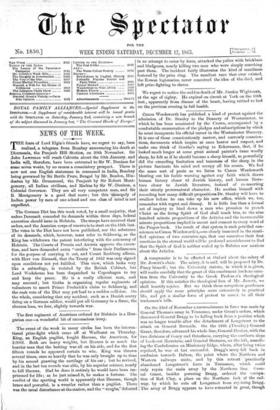Canon Wordsworth has published a kind of protest against the
admission of Dr. Stanley to the Deanery of Westminster, to which he has been nominated by the Crown, accompanied by a comfortable enumeration of the pledges and subscriptions by which he must inaugurate his official career in the Westminster Deanery. It is one of those conscientiously narrow, and narrowly conscien- tious, documents which inspire at once horror and respect, and make one think of Goethe's saying to Eckermann, that, if he looked much longer at some great animal painter's tame woolly sheep, he felt as if he should become a sheep himself, so powerfully did the exceeding limitation and tameness of the sheep in the picture fascinate his mind and occupy all his senses. We feel the same sort of panic as we listen to Canon Wordsworth bleating out his feeble warning against any faith which draws human history closer td Jewish history, and human litera- ture closer to Jewish literature, instead of re-asserting their utterly preternatural character. He soothes himself with recording how many difficult propositions Dr. Stanley will have to swallow before he can take up his new office, which we, too, remember with regret and dismay. It is little less than a formal act of impiety to bind down a man who promises to preach Christ as the living Spirit of God shall teach him, to the nine hundred minute propositions of the Articles and the innumerable minute propositions implied in assent and consent to every word of the Prayer-book. The result of that system is such petrified con- sciences as Canon Worclsworth's,—so closely immured in the strati- fied opinions of two centuries ago, that one conceives their first emotions in the eternal world will be profound astonishment to find that the Spirit of God is neither sealed up in Rubrics nor anxious about the Articles.


































